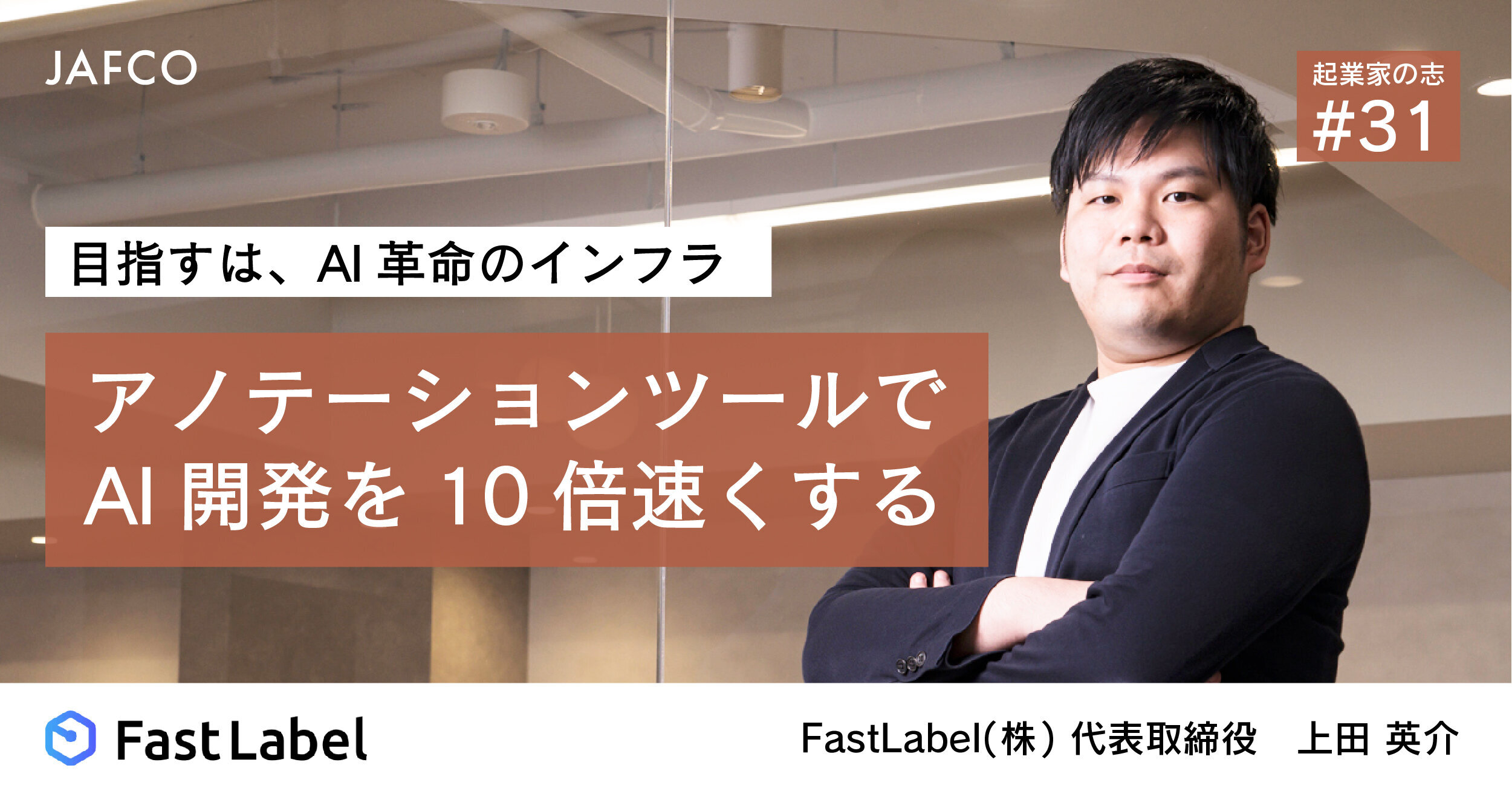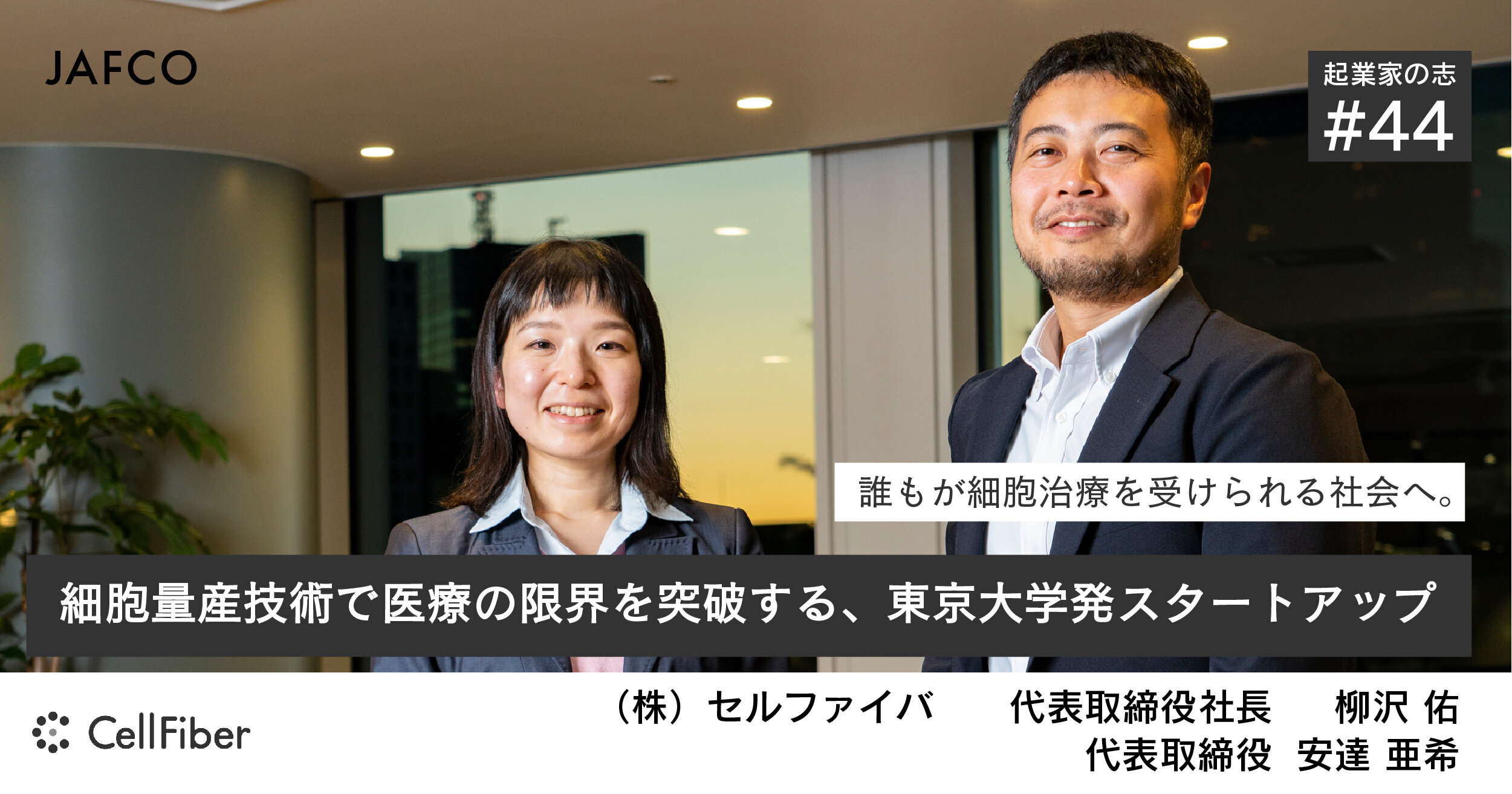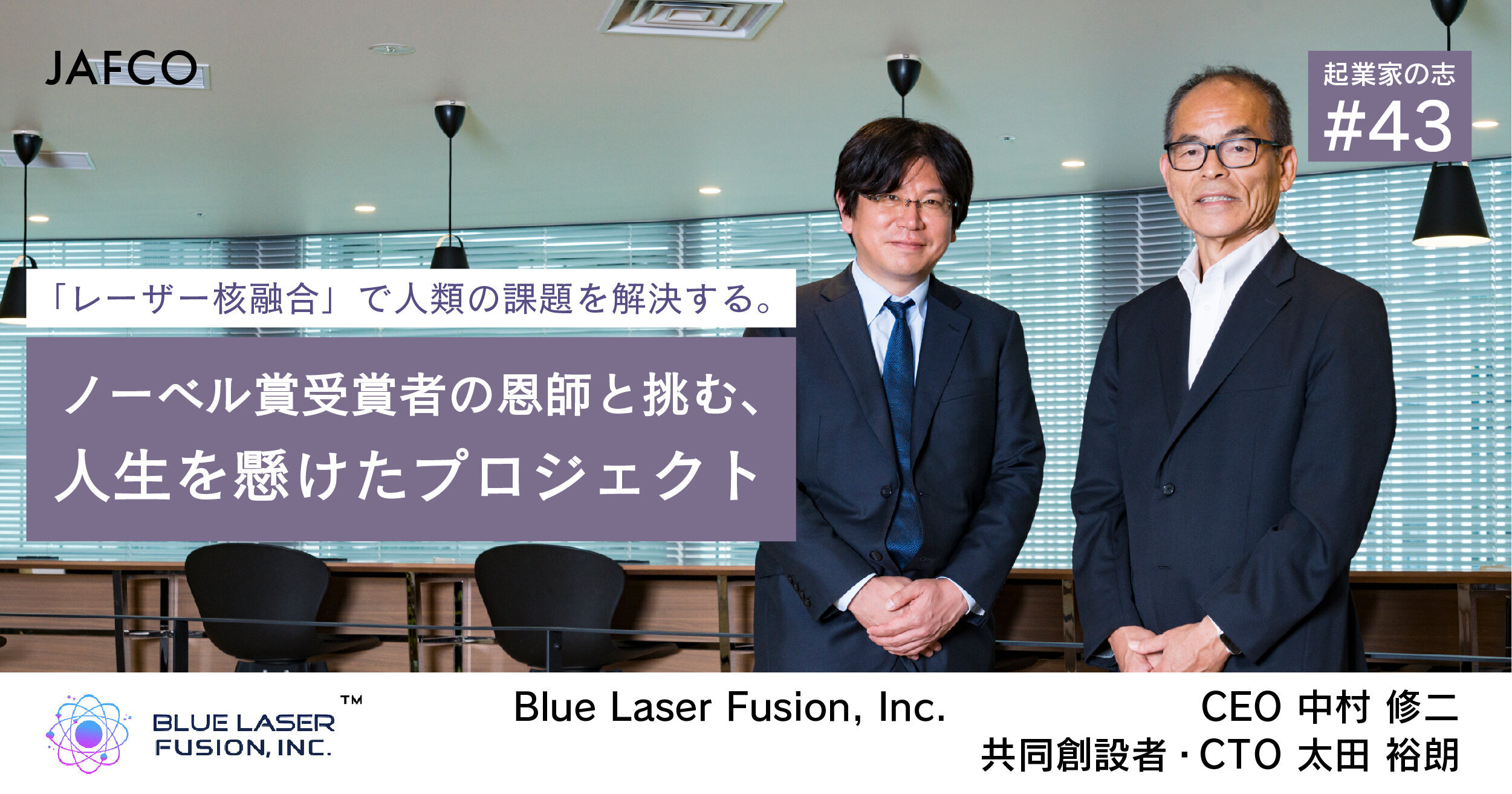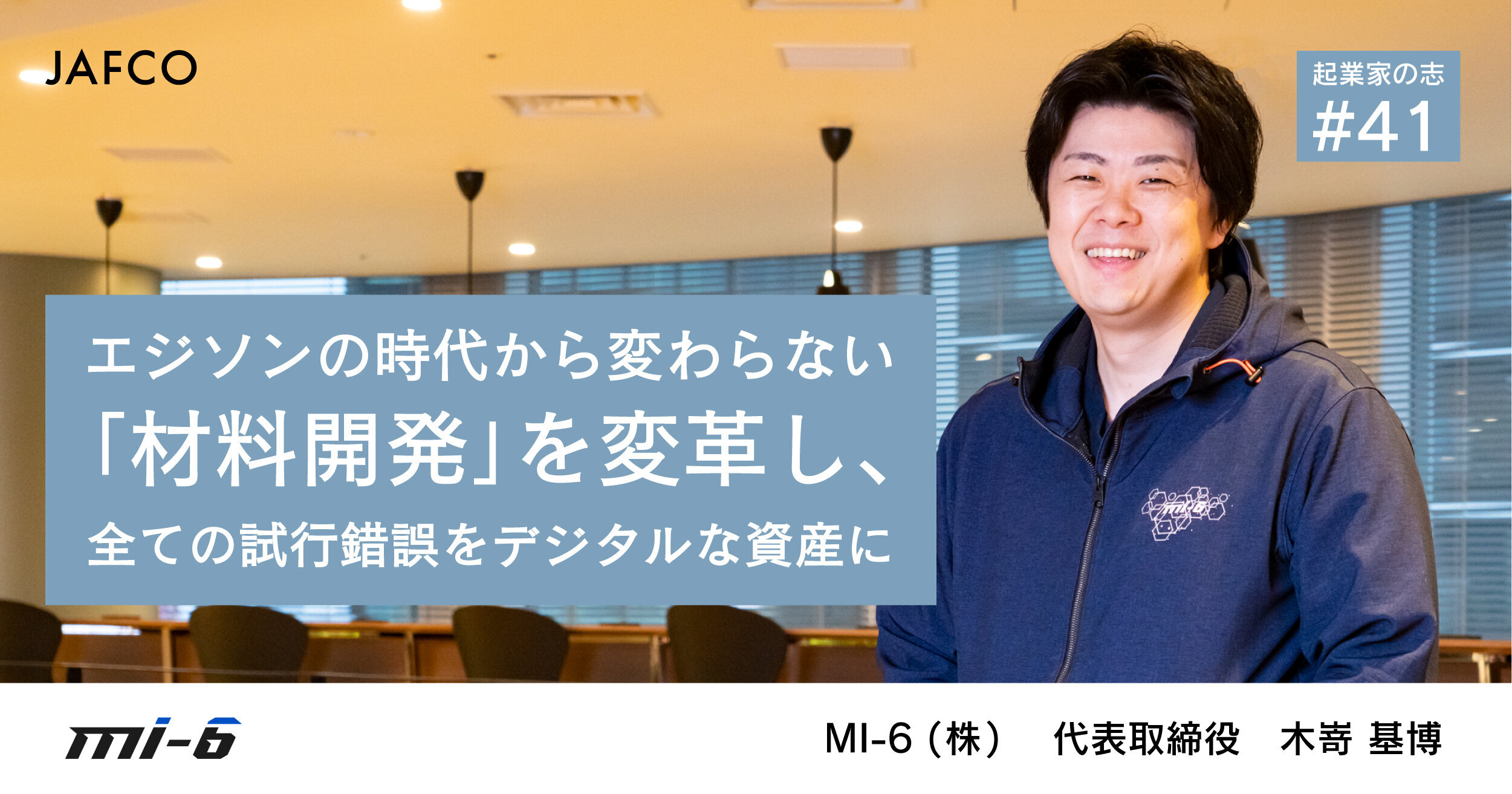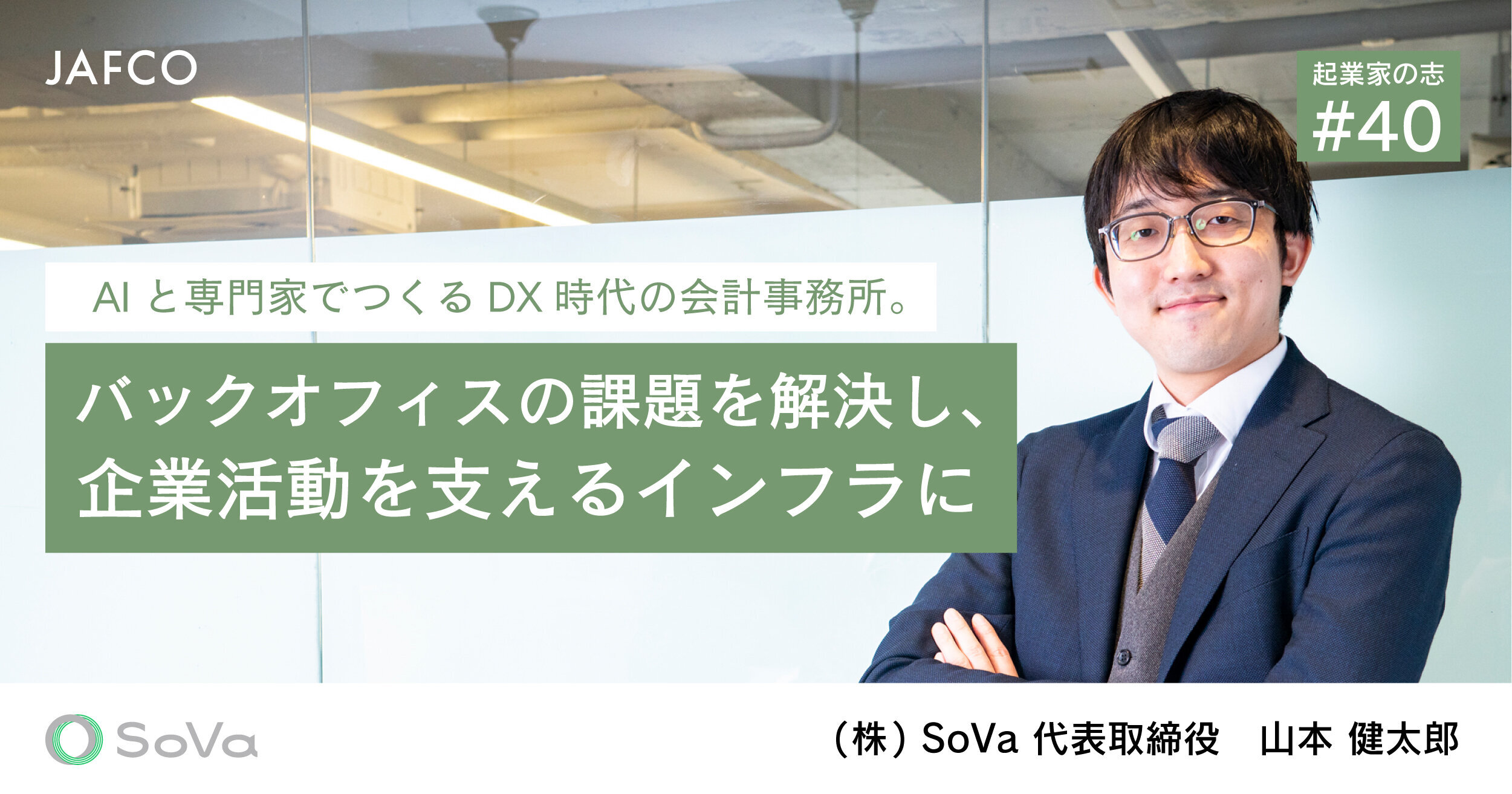"Entrepreneur's aspirations" to hear the background of deciding to start a business, the conflicts until the business gets on track, and the desires to realize through the business.
In the 31st installment, Mr. Eisuke Ueta, CEO of FastLabel Inc., which was selected as one of Weekly Toyo Keizai's "100 Great Ventures" 2022 edition, will appear, and talk about future business challenges with the perspective of Takayuki Matsumoto, the capitalist in charge.
【profile】
FastLabel Inc. CEO Eisuke Ueta
Graduated from Kyushu University, Faculty of Science, Department of Physics, Information Science. Engaged in the development of accounting products for two years as a software engineer at Works Applications Co., Ltd. In his second year, he became the first engineer to be assigned to the Los Angeles branch office. Designed and developed an AI-OCR invoice management service tailored to American business practices. After that, he developed an MLOps platform at an AI venture in the UK and promoted a DX project for a major bank. Founded FastLabel based on the formative experience he felt while implementing AI in society.
[What's FastLabel Inc.]
With the mission of becoming an infrastructure for the AI revolution, the company develops and provides the AI data platform "FastLabel", which includes annotation tools, outsourced training data creation, data collection and sales, and MLOps construction. It aims to solve the data problems that have become the Achilles heel of social implementation of AI and push Japanese companies and industries to the world level. Series A funding was conducted in August 2022 with plans to triple the organizational scale will to 50 people in one year.
Automate AI development bottlenecks with technology
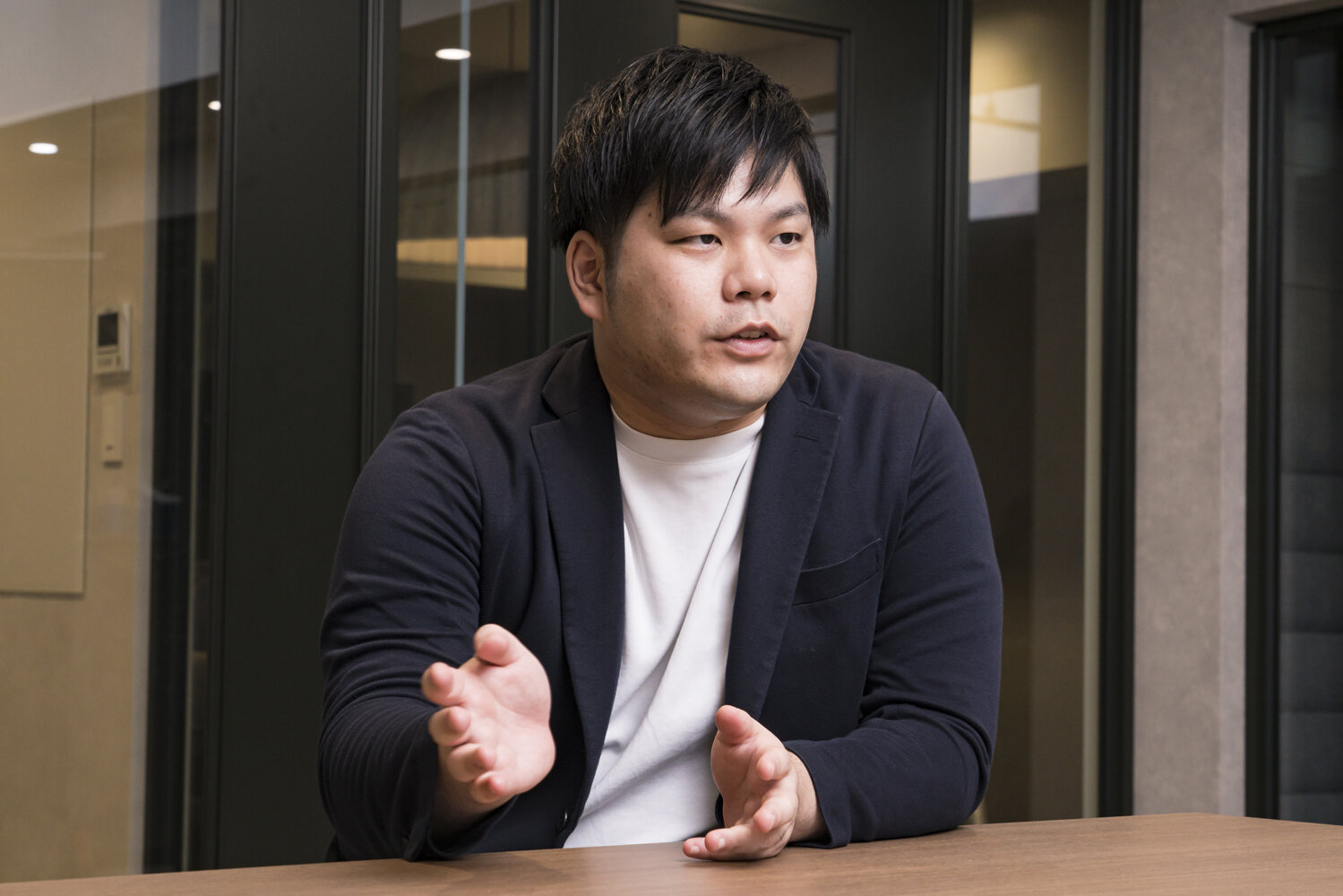
―Please tell us about the business of FastLabel.
Ueta FastLabel provides a SaaS-type platform "FastLabel" that facilitates the creation and annotation of data that is the basis of AI development. AI development deals with huge amounts of data, so it often takes a lot of time but FastLabel" can speed up the process by 10 folds.
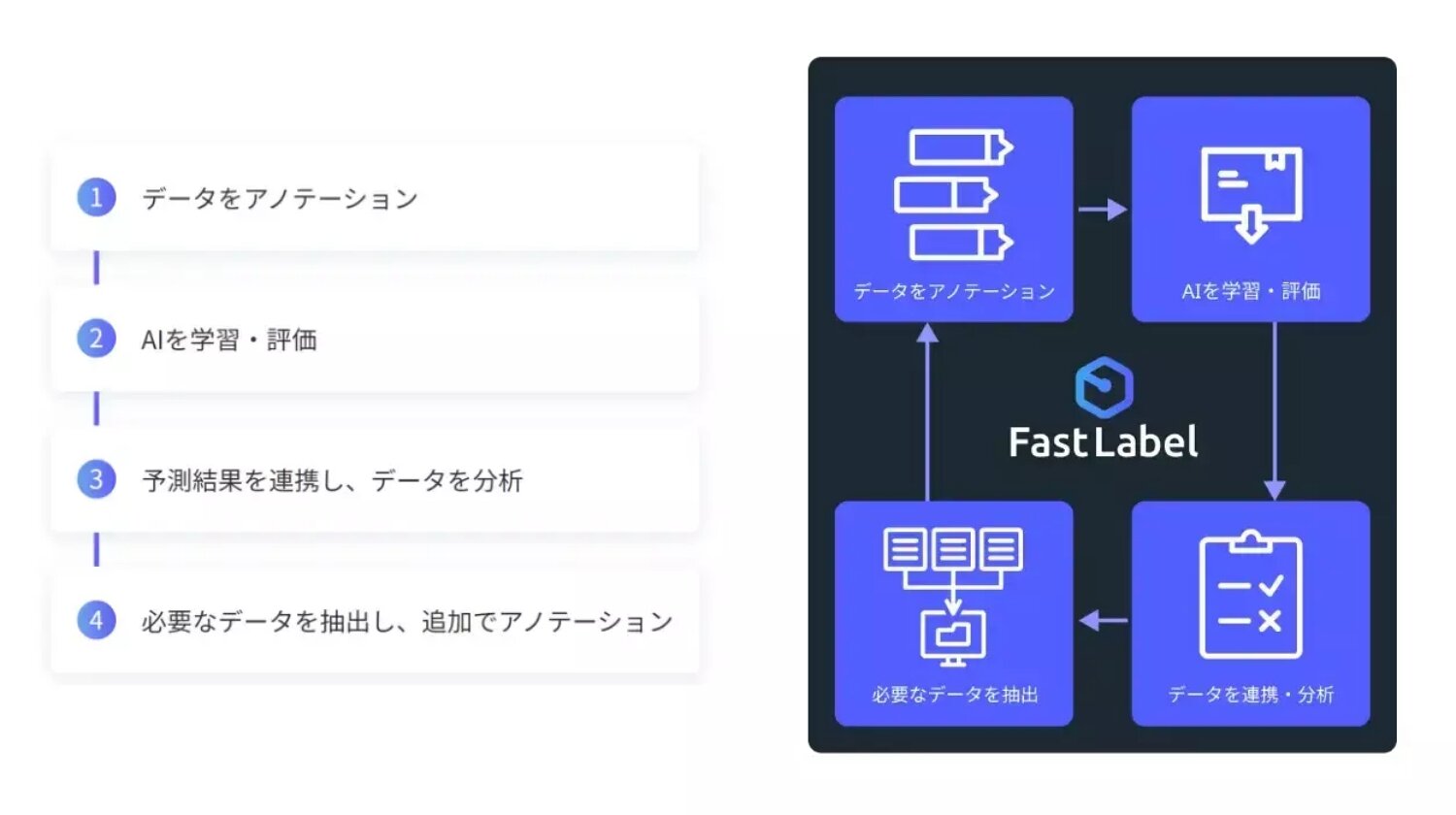
―Could you tell us more about "annotation"? What specific tasks can be made more efficient through automation?
Ueta In AI development, it is necessary to create training (correct) data for AI to learn. This work is called annotation. For example, if you want to create a service that allows AI to detect cars and people from photos of the city, the task is to tag each piece of data with "This is a car" and "This is a person" and have the AI learn. In some cases, tens of thousands of training data may be required. Annotation is the starting point of the AI development process and is said to account for 80% of all development work.
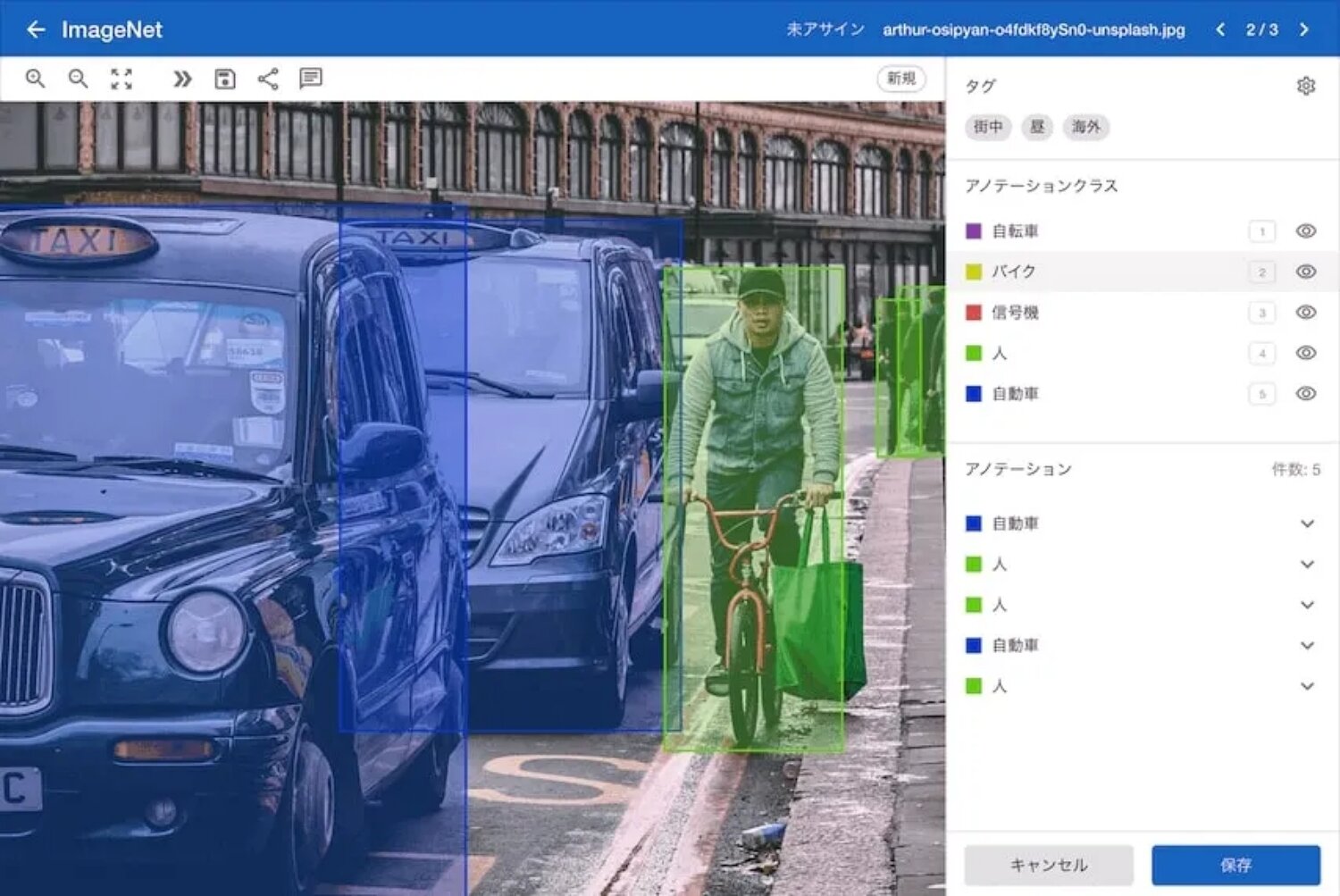
By using FastLabel, after manually classifying the first 100 items of data, AI automatically learns and sorts the remaining tens of thousands of items of data.
Large companies hold a large amount of raw data, but the process of creating training data is costly, and in many cases AI utilization is slow to progress. We would like to solve the problem of annotation, which is a bottleneck in such AI development, with "FastLabel".
Within one year of the platform's official release, it has been adopted by major companies and universities, and has achieved a 70% reduction in data preparation costs and a 30% improvement in AI accuracy.
Work efficiency is improved by automating annotation, which tends to be labor-intensive, with technology. Furthermore, "FastLabel" has both quality control and learning evaluation functions, and also oversees services such as training data creation agency, data consulting, and model development.
―Your mission is to become the infrastructure for the AI revolution. Why did you focus on this area?
Ueta I myself was originally an AI engineer. I was in charge of software development at my previous job, Works Applications, and created data manually. As a formative experience, I had a sense of inefficiency issues.
As a formative experience, I had a sense of inefficiency issues. The turning point came when I was transferred to the U.S. office in my second year at my previous job, where I was in charge of designing and developing an AI-based invoice management service, and in my contact with companies in the U.K. and Europe, I realized that AI utilization was much more advanced than in Japan. Many companies were considering how to achieve cost-effectiveness, and the bottleneck there was the complexity of data creation and the assurance of AI accuracy.
Overseas, there are a number of unicorn companies that are focusing on this issue and developing business in the annotation field. I felt that this trend would definitely come to Japan as well. Even as an engineer, I thought, "I don't want to do unrefined work like manually classifying data" (laughs). So, I decided to create my own automated system.
-Did you ever have a desire to start a business?
Ueta Rather than wanting to be an entrepreneur, it's more like "I found a problem that led me to start a business." There was no company in Japan that developed a service that could solve the problem. It was a casual conversation with Suzuki, the co-founder, that got me started.
I had an opportunity to talk with Suzuki, who had already started a business, which led us to "Look for a business together." At another company, that he wanted to start a new business. At the time of our founding in 2020, we explored the business without limiting ourselves to annotations.
In the midst of this, as I had a foemative experience of sensing issues with annotation, we searched for corporate needs through test marketing, etc. and the problem became apparent, so I decided to focus on it. AI technology is a field that will be implemented in society over the next several decades, and I thought it was worth spending time and energy there.
―What kind of difficulties did you face when starting a business, and what were the difficulties after starting a business?
Ueta We, co-representatives, both came from engineering backgrounds and had absolutely no business knowledge or experience. We can develop products, but what do we do with customer acquisition? Starting from that point, we had a hard time with the lack of knowledge of the business market. Therefore, I decided to participate in an incubate camp after founding the company in order to understand the perspective of an investor. We received various feedback from investors, and we understood "This is how we do commercialization." We received very obvious advice that if we didn't understand the customer's needs, we couldn't move forward, so we conducted test marketing for annotations. We once sent about 100 messages to the company's "contact form". We gathered answers to our question "There is such a service, what do you think?" and realized the high market need for using annotation tools.
From January 2022, I became the CEO to strengthen the business side. Since Suzuki is an AI researcher, it was a business decision that if he could focus more on development, we would be able to achieve both product development and customer expansion. Currently, we have a sales member, and the sales side is about to start up.
Felt that FastLabel was indispensable for the paradigm shift in AI development
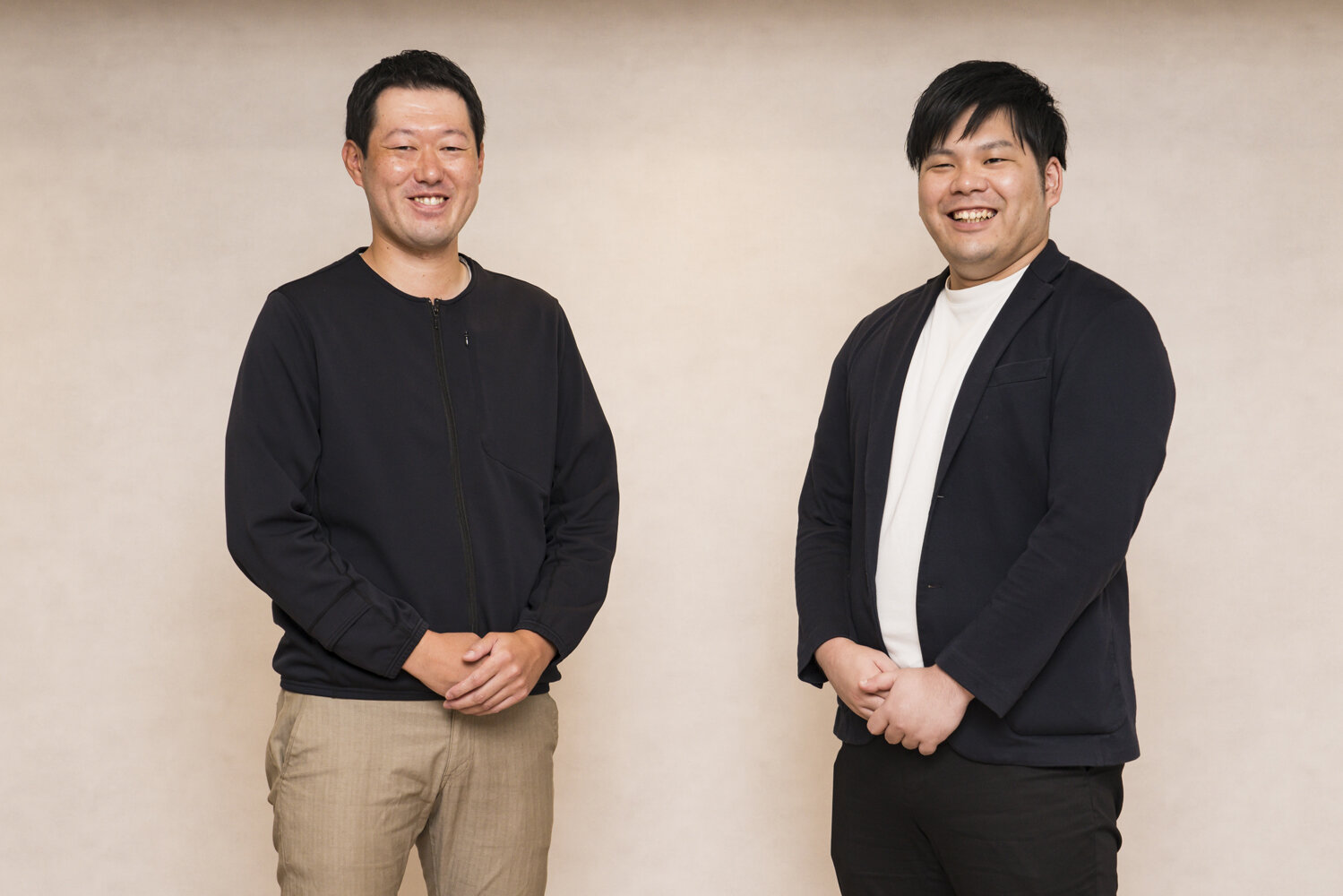 Mr. Ueta and JAFCO capitalist Takayuki Matsumoto (left)
Mr. Ueta and JAFCO capitalist Takayuki Matsumoto (left)
- In August 2022, you raised 460 million yen in Series A round. Please tell us about the background behind considering this funding, your encounter with JAFCO, and your first impressions of each other.
Ueta In the year since the official release of the platform in October 2021, sales had increased sevenfold and we were confident that we could further expand our business, so we began to think about raising funds at the beginning of 2022.
I met Mr. Matsumoto at the end of March 2022 through the introduction of President Watanabe of Quicker (former company name: 9seconds). I had spoken to Mr. Watanabe several times as an entrepreneur of the same generation. I saw a press release from Quicker that they raised funding from JAFCO, and realized that "There is a possibility of an investment in a Series A round as well!" I immediately contacted Mr. Watanabe saying, "I want you to introduce me to JAFCO!"
Matsumoto From he basic concept of what annotation is. Mr. Ueta explained things very carefully and in an easy-to-understand manner, and I thought he was a sincere person.
For startup entrepreneurs to go out into the world, it is very important to have the ability to explain difficult technologies in an easy-to-understand manner to people who do not understand them. It's the same with sales, and it's the same with an IPO. I got the impression that he could do that.
Ueta Mr. Matsumoto has a wealth of experience in investing in the BtoB area, and his quick understanding of the business gave me a sense of security.
Matsumoto We met at the end of March, so I thought we were behind other VCs. From the beginning, I wanted to proceed with the decision speedily.
―Why did you feel the potential of the FastLabel business?
Matsumoto In less than two years since the establishment of the company, there were transactions with major companies that were top in the industry, and sales were growing rapidly. It's not normal for a startup of this size. I thought that the Company had with strong technical strength in product development and this field of business had a big problem.
What left an impression on me was Mr. Ueta's talk that "a paradigm shift is occurring in AI development." Until now, companies' added value has been in developing their own algorithms. However, now that the hurdles to AI development have been lowered with the advent of open source AI algorithms, an innovation dilemma has arisen. Without the adoption of AI, the added value of services cannot be increased, and many companies have started to move to AI development. However, it is too costly to do it in-house, and the accuracy of AI does not improve easily.
Under such circumstances, when I went to talk to FastLabel's customers, there were many voices saying, "The cost has been reduced to one-fifth" and "AI accuracy has improved dramatically." I felt that it perfectly matched the needs of the times to come. Also, when I was shown the product, it was impressive that it used UIUX design which even non-engineers could use.
Ueta This is related to the context of the paradigm shift, but from now on, it will be the people in the field who will create training data, not AI engineers. For example, when trying to create an AI for identifying defective products at a manufacturing site, AI engineers cannot distinguish between good products and defective products. If people who specialize in that work develop AI, I thought it would be extremely important to have use UI/UX that anyone could use.
Matsumoto It has been around for 20 years, and AI has been around for 10 years. Until now, IT has mainly penetrated in the advertising/media and retail domains. Right now, the manufacturing industry, construction industry, infrastructure, etc. have just started to use AI and implement it in society. If FastLabel is trying to solve that bottleneck, I felt that this is a very interesting and expansive business.
―Could you tell us why you chose JAFCO, Mr. Ueta?
Ueta With his speedy response, he repeatedly conducted interviews and discussions with customers, and I felt that Mr. Matsumoto would be able to engage in management from the same perspective. I also thought that having JAFCO, a major VC, as a shareholder would lead to the trust of our customers.
As a beginner entrepreneur, I think you may be at a loss as to what steps you should take as you grow at once with the aim of an IPO. In such a case, advice from Mr. Matsumoto, who has a lot of IPO support experience, should be of great help. I would like to move forward together while removing obstacles in advance.
―Please tell us about the support after investment and what support you expect in the future.
Ueta I consulted Mr. Matsumoto on a lot of things, from the back office system to finance, even before the investment. In the future, I would like to expect more support for corporate promotion, branding, and recruitment. I think it is reassuring that there is a support system within JAFCO.
Matsumoto That's right. I think there are many points to worry during recruiting at a startup, such as "Is it okay to hire this person?" or "How shall we proceed with on-boarding after recruitment?" I would like to support you by sharing my experiences and introducing you to the managers of other investee companies.
From a user-first perspective, we want our customers' AI-based businesses to succeed.
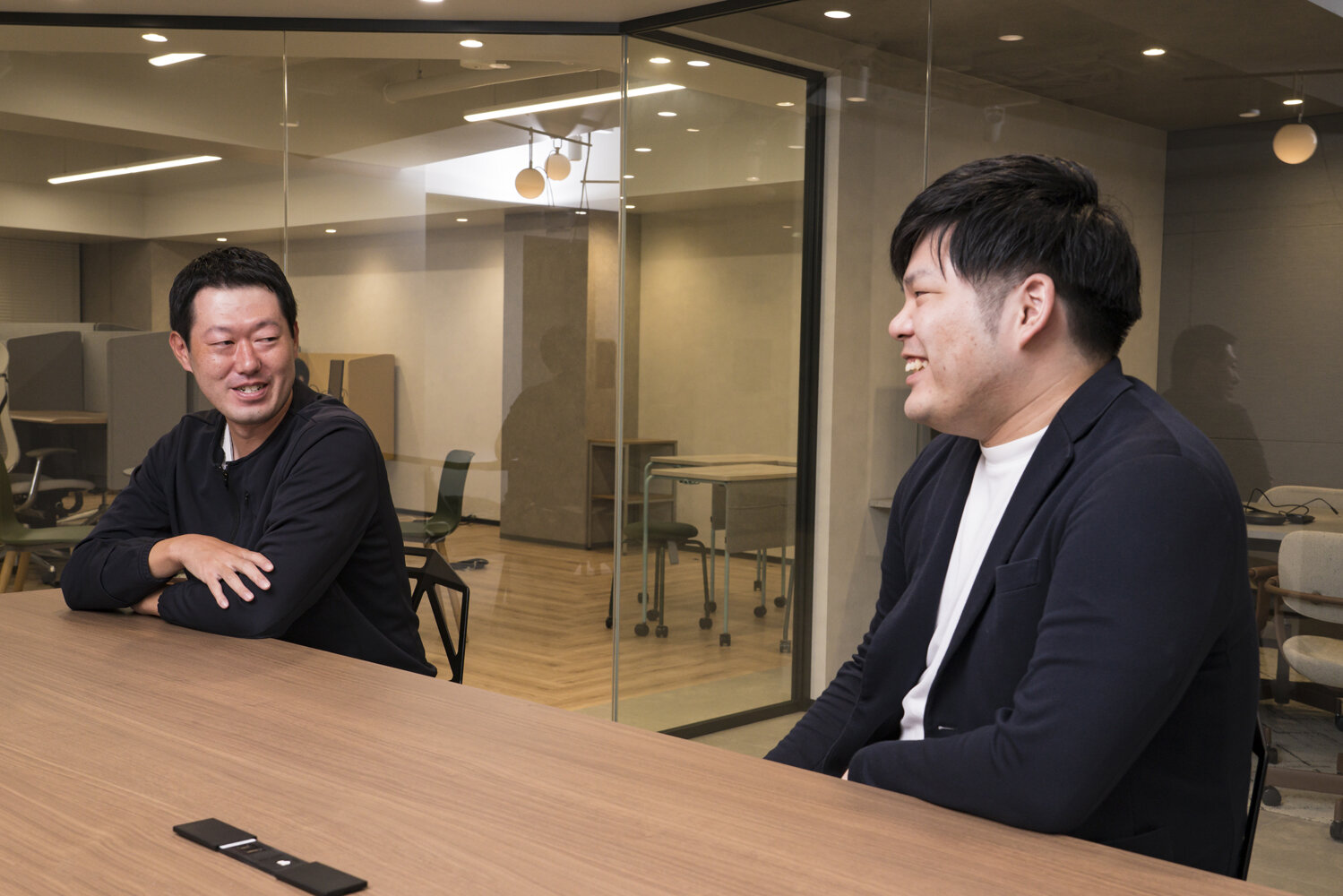
―Please tell us what you want to achieve in the future, and your aspirations as an entrepreneur.
Ueta I would like to expand our focus beyond annotations to include products that support the entire AI development process. For example, it would be nice if we could provide data to customers who do not have data or propose what algorithms can be used for optimal AI development.
What FastLabel is looking at is "establishing AI-powered businesses" with lower annotation costs. Most annotation companies in Japan undertake BPO, but what we are providing is a platform, and we would like to aim for a situation in which an AI business can be launched immediately if it is used. While AI projects are underway in various industries, we would like to accompany our customers in the zero-to-one phase.
By the end of 2023, we would like to double or triple the number of employees to 50. Building a sales system is essential for business expansion, so we would like to invite sales managers who want to start up an organization in the zero-to-one phase. I would like to pursue the "user first" philosophy that we have valued since our founding.
▶︎ Click here for FastLabel recruitment information
An interview with a sales representative titled "The challenge of sales to convey 'new value' in an immature cutting-edge market" is also included.
―Finally, please give a message to those who aim to become entrepreneurs and young entrepreneurs.
In the phase of creating a product in the seed round, there are too many uncertainties, and you don't know what will be established as a business. We first created the product, received opinions from various people, and worked on the importance of utilizing the PDCA cycles as much as possible. As you go along, the number of people who sympathize with you and help you will increase, leading to an organizational structure that aims to achieve a big vision. I think one way to do this is to take action instead of thinking only about negative things from the beginning.
Person in charge: Comment from Takayuki Matsumoto
 The use of AI is progressing in all industries, and with the rapid development of open source AI algorithms, we are approaching an era in which anyone can develop highly accurate AI. On the other hand, creating the training data necessary for AI development has the problem of handling a large amount of data and a large amount of work, which is labor-intensive and tends to be inefficient.
The use of AI is progressing in all industries, and with the rapid development of open source AI algorithms, we are approaching an era in which anyone can develop highly accurate AI. On the other hand, creating the training data necessary for AI development has the problem of handling a large amount of data and a large amount of work, which is labor-intensive and tends to be inefficient.
FastLabel is a platform with excellent UI/UX that can be used by non-engineers, automation function for creating training data, AI model learning/evaluation function, etc. In the first year since its official release, it has been introduced to top companies in various industries and is growing rapidly. In the future, we, at JAFCO, would like to further expand the functions of the AI platform and work together with the company to take on this big challenge so that it can become the infrastructure for the AI revolution.

